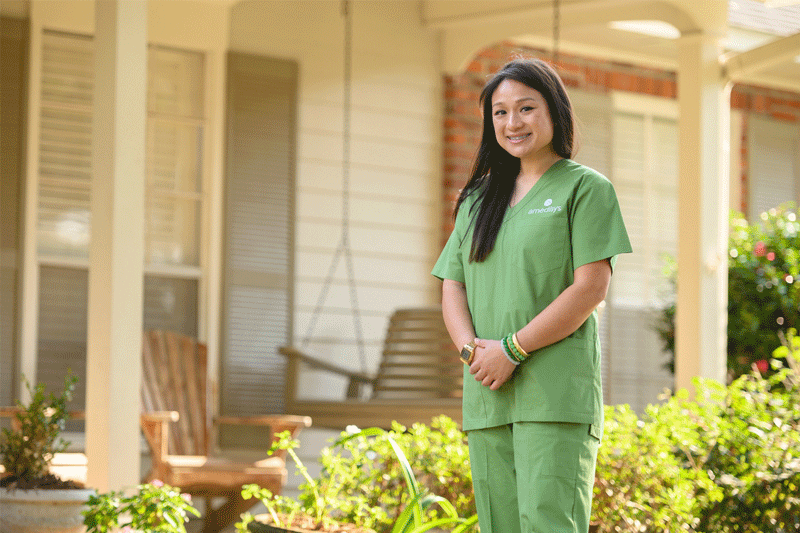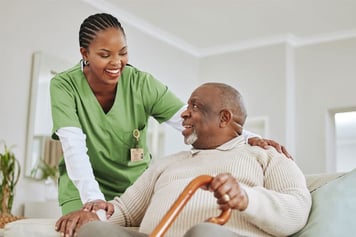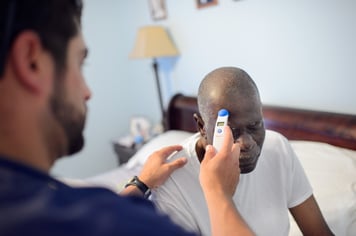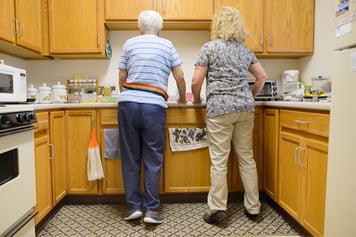Talk about taking a job personally. Talk about going the extra mile. Kerri King is 16 years a nurse, the two most recent years with Amedisys, and it’s her identity from head to toe.
She’s an LPN for Amedisys’ Coosa Valley Home Health in Cedartown, Georgia, by definition a clinician, but her job is a lot more than clinical. Be patient, please: an explanation is forthcoming.
WHAT DOES AN LPN DO IN HOME HEALTH?
In the home health care setting, Licensed Practical Nurses:
- Provide one-on-one skilled nursing care and treatment to patients in their home.
- Use a comprehensive and patient-specific care plan with innovative solutions.
- Spend quality time with the patient, in their own home, to promote their health and independence.
- Collaborate with physicians, patients and their families, nurses, therapists, social workers and other members of the patient care team to implement and follow a patient specific care and treatment plan.
- Cooperatively utilize varied solutions to educate and promote the health and independence of the patient.
- Assess, monitor, document and report progress of patients’ health and condition using required documents such as clinical progress notes using a clinician-preferred technology within established timelines.
To start her day, Kerri takes her two children, Briley, 13, and Avery, 9, to school, and then opens her tablet to check her schedule. There, she checks her patients’ status and evaluates the actions she will need to take. Then, as early as possible, she sees her first patient.
Most of her patients have a chronic illness such as diabetes, chronic obstructive pulmonary disease (COPD), congestive heart failure. She puts in four days a week, for eight to nine hours a day, driving around within a single county and documenting each case as she goes along.
[action 1]
Recently, Kerri observed a patient was running a fever and had a bad cough. She suspected pneumonia. In response, she called for her to be sent to the hospital. As it turned out, the patient had blood clots in both lungs requiring immediate treatment. “Good call,” her supervisor told her.
Kerri routinely performs all the tasks that all LPNs are supposed to perform. In the course of an average day, she may deliver intravenous therapy, collect biological samples for laboratory tests and administer vaccines or antibiotics. She may also take an audiometer reading, treat bedsores, do pulse oximetry tracking and insert and remove catheters. Throughout, she applies her seasoned judgment to the all-important process of triaging patients.
Kerri also takes seriously her responsibility to teach patients how to take care of themselves. Recently, she entered a home for a visit and saw a patient with high blood pressure eating potato chips in front of the TV. Uh-oh. She took the opportunity to educate the patient about the disease and its treatment.
“Let’s talk about your diet and your high blood pressure,” Kerri said, gently broaching the topic. “You know, sometimes I like to eat salt, too. But it’s my job as your nurse to tell you that eating potato chips can make your blood pressure go up. You could gain weight and become short of breath and even have to go the hospital.”
Away went the potato chips.
Kerri sees opportunities to improve patient outcomes everywhere. If it’s been a while since she’s seen a patient, or she’s never seen a patient before, she’ll ask the previous nurse for details. Any time a patient of hers goes to the hospital, she’ll call the staff in charge for an update.
“I like to know if they kept a patient overnight or sent her home,” she says. In either case, she’ll eventually follow up with discharged patients to learn how they’re doing.
But being a clinician entails more than carrying out important procedures and protocols. “The patients become your friends,” Kerri says. “They ask about your husband and kids. You play with their grandchildren.”
Caring comes to her naturally, as if it’s in her DNA. She acted as a nurse for her mother, who had terrible migraine headaches, giving her a cold towel to press against her brow and relieve the pain. “I always wanted to be a nurse,” she says. Kerri even cared for her husband’s grandmother at bedside in hospice.
To Kerri, being a nurse is about more than nursing. “It’s important to have a relationship with patients,” she says. “I treat all my patients like family.”
For her, the psychological and spiritual aspects complement the physical. “A lot of our patients have no one. You see people living at home and they have no family or friends who visit. You may be the only sunshine they get all day long.”
Once, she had a grumpy patient from New Jersey who made fun of her Southern accent. “Before we’re done together,” she warned him, “you’re going to love me.” Months later, she turned out to be right. Hearing the news that she had visited him for the last time, he cried. “You’ll never know how much you mean to me,” he said.
Taking her job personally, going the extra mile – it’s all in a day’s work. “If a patient is struggling, I try to provide strength,” she says. “Just before I leave the home, I may give the patient one last hug or a squeeze of the hand or say ‘I love you.’ If I sense they might be religious, I may say, ‘Do you mind if I say a little prayer for you?’”
“Nobody has ever said no.”
Are you an LPN interested in pursuing a career in home health? Learn more about our career opportunities at careers.amedisys.com to be connected with a recruiter or to find open jobs near you.





